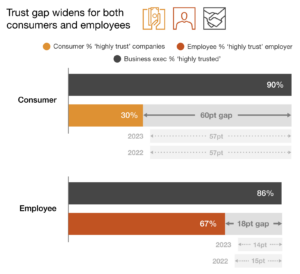In the realm of business, there’s a lesson to be learned from the current turbulent waters of politics. As business leaders, we have a unique opportunity to reflect on the erosion of trust that we are witnessing in governments worldwide and understand its implications for our own impact.
Across various levels of government, trust from the communities they serve has significantly dwindled. Whether it’s local, provincial, or national, examples of actions that have contributed to this loss of faith are unfortunately plentiful. Taking a quick glance at the daily news headlines will highlight the repercussions of this eroding trust. Take, for example, the current issue regarding the carbon tax at the federal level in Canada. Despite much expert consensus suggesting that the current policy is the most effective for both environmental and economic outcomes, it struggles to garner support. Although many factors are at play here it is a great example of how a disconnect between policy effectiveness and public acceptance underscores the profound impact of lost trust.
My opinion here is not intended to be political. Rather, it serves as a broader discussion on the state of governance and the repercussions of diminishing trust. This is not an isolated government issue. Consider that 90% of business executives think customers highly trust their companies while only 30% of consumers actually do. In the business world, we must see this as a warning and reflect on our own practices.

In our pursuit of success, we often focus on what we can do, striving for growth and profitability. However, it’s equally important to pause and consider what we should do. The trust placed upon us by our customers and stakeholders is invaluable. It forms the bedrock of our relationships and the foundation of our brands.
Just as citizens expect transparency, accountability, and integrity from their governments, customers demand the same from businesses. Therefore, it’s paramount that we not only work to earn but also maintain their trust. We must act ethically, communicate openly, and prioritize the interests of those we serve.
I don’t intend for this to sound like an altruistic endeavor; rather, it’s a strategic necessity. Trust, or the lack of it, is directly tied to the success and longevity of our businesses. Just as trust forms the cornerstone of strong governance, it serves as the bedrock of enduring relationships and sustainable growth in the corporate world. It isn’t just about a moral obligation but a pragmatic strategy for our continued success.
